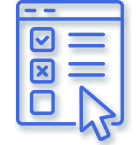What does an Addiction Counselor in Hawaii do? What is Their Job Role?
The Hawaii Government is a certification authority for substance abuse counselors. The state authorizes a primary certification for Hawaii substance abuse counseling, and it has other certifications for supervisors, criminal specialists, human services, co-disorders, and support assistants. The primary substance abuse counseling credential is the Certified Substance Abuse Counselor CSAC. This basic substance abuse counseling credential has two goals. First, the credential informs the public that the holder has met the requirements of the law for the profession. Second, the government recognizes the education, ethics, knowledge, experience, and competence of the individual to provide substance abuse counseling. The certification is not an entry-level credential; it represents the full range of substance abuse counseling.
Compare Popular Online Substance Abuse Counseling Programs
Overview
Hawaii Revised Statutes 321-193(10) authorizes the Department of Health Alcohol and Drug Abuse Division ADAD to certify Hawaii substance abuse counselors and treatment and prevention program administrators. The Division is a member board of the International Certification and Reciprocity Consortium (IC&RC). The Hawaii Board uses 12 Core Function competencies and applicants must demonstrate drug and alcohol education, a defined period of supervised work experience, and pass the IC&RC exam.
Licensing & Certifications for Associates & Independent Counselors
Certified Substance Abuse Counselor (CSAC)
The CSAC performs important functions in the Hawaii approach to drug abuse treatment and prevention. Hawaii handles drug-involved defendants through a diversion to Drug Courts. The courts employ CSAC qualified persons as substance abuse counselors to provide human services, substance abuse counseling, education, and rehabilitation services to offenders with significant addictions or dependencies. The Government revised the general application, effective October 6, 2017, to amend the work experience requirement for licensed master’s degrees and higher.
Certified Clinical Supervisor (CCS)
The CCS is a credential for certified substance abuse counselor CSAC teaching and supervision. It requires a master’s degree in a relevant field or CSAC, CCJP, or CCDP certification. The need for counselors grows as governments address the rapid increase in drug and alcohol addiction across the US. The rise in the number of counselors has a similar effect on the need to increase the number of counselor supervisors. Supervision is needed to manage systems and they also must provide training and clinical supervision. The applicant must pass the specific clinical supervisor exam.
Certified Criminal Justice Addictions Professional (CCJP)
The Hawaii substance abuse certification requires a dual focus on mental disorders and the dynamics of health alcohol and drug abuse. There is a very high percentage of addictions among jail and prison populations in the US. Hawaii has mobilized a special substance abuse counseling credential to provide treatment among the incarcerated population. Applicants must pass the IC&RC-CCJP exam.
The Hawaii substance abuse certification has multiple areas requiring study and competence. Applicants must understand the criminal justice system and the purpose of criminal rehabilitation. They must understand the concepts of criminal behavior and theories on crime and causes. Applicants must be able to relate the disciplines into an approach to substance abuse counseling that is aware of the offender’s overall situation.
This is not meant to be an entry level substance abuse certification and, as such, requires applicants to have 6,000 hours of work experience gained within the last ten years. This experience can include a variety of supervised work experience within the criminal justice system or education. However, only a high school diploma is actually required.
Certified Prevention Specialist (CPS)
The scope of the Hawaii substance abuse certification supports counseling but is not a direct counselor certification. The certified prevention specialist area of focus is drug education and drug prevention. Knowledge and communications are key strengths of prevention specialists. They must understand drug treatment and the dynamics of drug and alcohol dependency. They must be able to engage individuals, families, and the public with useful, evidence-based information.
As with the CCJP, anyone with a high school diploma can earn this credential. However, any applicant wishing to take the requisite exam must have completed 120 hours of education on prevention-specific topics. They must also complete the requisite numbers of supervised hours working on prevention topics.
Education Requirements
The Hawaii Board authorizes four types of counseling credentials; the Board certifies the CSAC, the CCDP the Co-Disorder credential, the CCDP-Diplomate, and the Criminal Justice counselor credential (CCJP).
Certified Substance Abuse Counselor (CSAC)
The minimum requirement is a High School diploma or a GED. College and graduate degrees help reduce the amount of experiential hours required for certification. The Hawaii substance abuse certification requires 300 clock hours of ADAD approved Department of Health Alcohol and Drug Abuse Division ADAD education in the below-listed performance domains with special attention to the knowledge and skills of the 12 Core Functions:
- Screening
- Intake
- Orientation
- Assessment
- Treatment Planning
- Counseling
- Case Management
- Crisis Intervention
- Client Education
- Referral
- Report and Record Keeping
- Consultation with other professionals in regard to client treatment/services
The Board permits applicants to use online learning for up to 135 of the 300 hours.
Supervised Training
The CSAC must perform and have documented a minimum of 400 hours of supervision and practical substance abuse training. The training must include the 12 Core Functions and occur in a setting that delivers health alcohol and drug abuse treatment. The applicant must further show the performance of 20 hours or more in each of the 12 Core Function areas. The core functions are described in the items below.
- Screening for substance abuse issues and possible co-disorders
- Intake is official registration and placement for the treatment services
- Assessment of addiction and overall client situation
- Orientation to the program and counseling resources
- Treatment planning addresses the identified issues for counseling therapy
- Counseling in individual, family, or group settings on abuse and recovery
- Education services that include clients, families, and the public
- Reports and records
- Case administration and management including revising treatment plans
- Crisis and intervention skills and awareness
- Consultation and team collaboration on complex cases
- Referral to other organizational resources and outside of the organization when needed
Certified Criminal Justice Addictions Professional (CCJP)
The Certified Criminal Justice Addictions Professional requires education in the below-listed competences.
- The relationship between criminal conduct and addictions
- The functioning of the Criminal Justice system
- Client screening, addiction evaluation, and assessment.
- Drug and Alcohol Counseling
- Case documentation
- Developing treatment plans
- Addiction case management, offender supervision, and offender monitoring
- Legal, counseling profession ethical responsibility
A high school educated applicant will need 270 hours of education focused on the required competencies. Applicants with a qualifying associate’s degree must show 200 hours. A substance abuse applicant with a CSAS certification or qualifying bachelor’s degree will need 150 hours. With a CCS or qualifying master’s degree, the Board reduces the education requirement to 100 hours.
Find Your Online Addiction Counseling Program
The Board requires 6,000 hours of work experience for the CCJP work, applicants can reduce the work requirement by showing educational attainment in a related behavioral science field, or a prior certification. An associate degree can substitute for 1,000 hours of work experience. Applicants can cut 2,000 hours with credit for either a CSAC credential or a bachelor’s degree. Applicants can reduce the requirement by 4,000 for a CSS or master’s degree. The Board requires 200 hours of supervised work within ten years of the test date, and applicants can reduce that amount by education or prior Board Alcohol and Drug abuse counseling certification. Applicant must deliver official transcripts for health alcohol and drug abuse education credit from schools, colleges, and universities totaling 270 hours or less with associate’s, bachelor’s, and master’s degrees.
Certified Co-Occurring Disorder Professional-Diplomate (CCDP-D)
The general application for the CCDP-D is a master’s degree in behavioral health with a strong clinical focus. Co-occurring disorders are when substance use disorder or alcohol use disorder exist as part of or independent of a mental illness diagnosis. A certified substance abuse counselor must connect the dynamics of addiction and mental disorders. The advanced degree may be earned in co-occurring disorders or in another related behavioral health discipline that includes a clinical focus. The requirements include six hours of ethics study; the applicant must demonstrate 140 hours of approved education focused on relationships between physical or mental disorders and substance abuse.
The work experience requirement for the CCDP-D calls for 2,000 hours of documented work focused on co-occurring disorders. The applicant must prove the performance of the work experience hours within the ten years prior to application. The certified substance abuse counselor will also need 100 clinical supervision hours; among the overall total, the applicant must perform ten hours in each of the ten required domains.
Non-Counselor Certification
Certified Prevention Specialist (CPS)
This certification requires a high school diploma, GED or higher level of education. Applicants must demonstrate competence through work experience in evidence-based treatment practices, prevention methods, and public safety programs. Prevention specialist must learn prevention ethics and pass a state-specific exam.
Certified Clinical Supervisor (CCS)
The program requires 30 Hours of education in IC&RC domains with four or more hours in substance abuse counselor development, human services, ethics, program and quality, counselor evaluation, case administration, and treatment. It asks 10,000 hours of counseling experience comprised of 6,000 hours of counseling experience and 4000 hours of health alcohol and drug abuse counseling.
CACREP Accredited Online Certification

Two types of accreditation are recognized in the United States; institutional and specialized. Institutional accreditation takes the entire institution into account while the specialized focus on professional preparation programs. The Council for Accreditation of Counseling and Related Educational Programs (CACREP) is a specialized accreditation that focuses on master’s and doctoral degree programs in counseling at colleges and universities worldwide. Only already-accredited institutions are eligible for CACREP review. The review for accreditation will center on programs offering graduate degrees in counseling.
Choosing a CACREP-accredited program ensures that the program meets the highest of quality standards. Many counseling specialties are accredited bythe CACREP, including addiction counseling. Accredited addiction counseling programs prepare individuals to work with those affected by addictive behavior and their families. Addictive behaviors include alcohol, drugs, food, gambling, sex, and anything else that negatively affects your personal or work life by creating addiction behaviors.
CACREP-accredited programs will focus on treatment models and the phases of addiction including human services, prevention, recovery, and relapse prevention. These 60-semester hour programs will include the application of interventions. When students choose a CACREP-accredited program they can be confident that:
- the program meets or exceeds national standards
- the program will focus on professional counseling rather than psychology oreducation
- the program has an excellent reputation
- CACREP graduates statistically receive higher scores on the National Counselor Examination for Licensure and Certification (NCE).
- the requirements for licensure will be met.
Department of Commerce and Consumer Affairs
Professional and Vocational Licensing Division (PVL)
The PVL Division oversees the Hawaiian Mental Health Counselor Program and licensure. The program implements educational requirements and licensure requirements are overseen by the PVL. The Division also provides continuing education information and handles complaints and disciplinary action pertaining to mental health professionals.
Address
P.O. Box 3469
Honolulu, HI 96801
Phone
(808) 586-2692
Website Address
http://cca.hawaii.gov/pvl/programs/mental/
Licensure:
- Licensed Mental Health Counselor (LMHC)
Counselor Testing & Examination Process

The Hawaii government is a Member Board of the International Certification & Reciprocity Consortium/Alcohol and Other Drug Abuse, Inc. (IC&RC/AODA). The government certifies qualified substance abuse counselors. Applicants must pass the International Written Certification Examination and the Case Presentation Method Oral Examination.
The basic procedure involves getting the application materials from the Hawaii Board website. You must then assemble the documents that the board requires. The requirements vary for each credential but generally, applicants must arrange delivery of transcripts and official school records to prove educational attainment, and they must present business records to prove job-related experience or volunteer work and wait for a positive response from the Board. Applicants must pay a $25 application fee and, effective July 2017, a $125 test fee (you must refer to the application materials for the exact amount and payment options).
The board uses Wednesday and Thursday as processing days and advises that the expected waiting period for review is four to six weeks.
Clinical Supervision Explained

Clinical supervision is an educational and professional development tool. The clinical supervisor- counselor relationship is a guided learning process that uses observation and feedback to help counselors develop and expand counseling skills, knowledge, and critical thinking. In Hawaii, the supervisor must be an approved supervisor such as on possessing the Certified Clinical Supervisor certification.
Clinical supervision takes place in a clinical setting. A clinical setting is any time and place in which a certified substance abuse counselor interacts with a patient, patient’s family, and human services support system. The supervisor creates a supportive learning atmosphere in which ideas can flow freely in both directions. Clinical human services supervision can become a self-sustaining system of ongoing critical self-assessment as the counselor learns the importance of continuing to learn and expand counseling abilities.
Renewal and Continuing Education
Hawaii requires 40 hours of continuing education during the term of certification. The term is two years, and the board recommends taking 20 hours or more each year. The renewals may vary for each classification. For example, the CPS requires six hours of prevention ethics. Overall, Hawaii limits to a maximum of 45 hours each subject the coursework in individual counseling, group counseling, family counseling, human services, and cultural diversity. The board permits an unlimited number of alcohol and drug abuse courses.
Potential Counselor Career Path Options
- Addiction Counselor
- Alcohol and Drug Abuse Addiction Counselor
- Behavioral Health Specialist
- Certified Addiction Drug and Alcohol Counselor
- Chemical Dependency Counselor
- Mental Health Counselor
- School Counselor
- Substance Abuse Counselor
Associations & Organizations

The IC&RC -International Certification & Reciprocity Consortium provides testing for credentials and performs the important task of international recognition of counseling credentials. Because Hawaii is a group of islands separated from the 48 states, reciprocal credentials are more important than in other states. Hawaii can accept credentials earned elsewhere, and other states can recognize Hawaii certifications and credentials.
